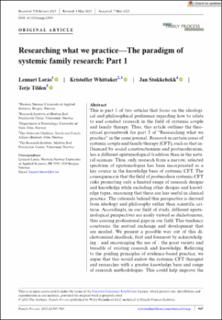| dc.description.abstract | This is part 1 of two articles that focus on the ideological and philosophical preference regarding how to relate to and conduct research in the field of systemic couple and family therapy. Thus, this article outlines the theoretical groundwork for part 2 of “Researching what we practice” in the same journal. Research in certain areas of systemic couple and family therapy (CFT), such as that influenced by social constructionism and postmodernism, has a different epistemological tradition than in the natural sciences. Thus, only research from a narrow, selected spectrum of epistemologies has been incorporated as a key source in the knowledge base of systemic CFT. The consequence is that the field of postmodern systemic CFT risks promoting only a limited range of research designs and knowledge while excluding other designs and knowledge types, reasoning that these are less useful in clinical practice. The rationale behind this perspective is derived from ideology and philosophy rather than scientific criteria. Accordingly, in our field of study, different epistemological perspectives are easily viewed as dichotomous, thus causing professional gaps in our field. This tendency constrains the mutual exchange and development that are needed. We present a possible way out of this dichotomized deadlock, first and foremost by acknowledging – and encouraging the use of – the great variety and breadth of existing research and knowledge. Referring to the guiding principles of evidence-based practice, we argue that this would endow the systemic CFT therapist and researcher with a greater knowledge base and range of research methodologies. This could help improve the quality of treatment provided to our clients and enhance the legitimacy of postmodern systemic CFT as a branch of psychotherapy. | en_US |

